Last Updated on August 1, 2022
Taking a breather from the repeatable mode of living and tedious work life is the shared interest of most of the people out there. Taking a trip away from the familiar work and life structure can rejuvenate the mood of a person to a great extent and allow them to get back to their creative best again. However, there are other dimensions attached to this idea of traveling and the most noteworthy of them is deciding a place to stay during the trip. Hotels are the most viable option in this scenario and if you have an app to assist you to book a hotel then you can shift your focus towards making your trip memorable.
Since the staying aspect of a trip holds a lot of weightage therefore travel and hospitality industry is growing at a rapid pace in the last few years. Hotel Booking apps have gained a lot of popularity by reducing the number of steps in booking a hotel for stay. This sudden shift of norms round hotel booking apps has drawn a lot of entrepreneurs in the market to get themselves develop a scintillating hotel booking mobile app and if you are also one of them then you will absorb a lot of knowledge regarding the whole concept.
Facts and Figures Associated with Hotel Booking App
We have already stressed the fact that the Travel and hospitality industry is growing leaps and bounds in the last year or so. People find the whole process of online hotel booking effortless which is directly contributing to taking the usage of hotel booking apps to a whole new level.
Data from research by Criteo revealed that
- 45% of bookings for the Online Travel Agency (OTA) proceed through mobile handsets.
- 80% of the last-minute reservations are performed via mobile phones.
- The conversation rates on mobile are five times that of the rate of conversion on the mobile web.
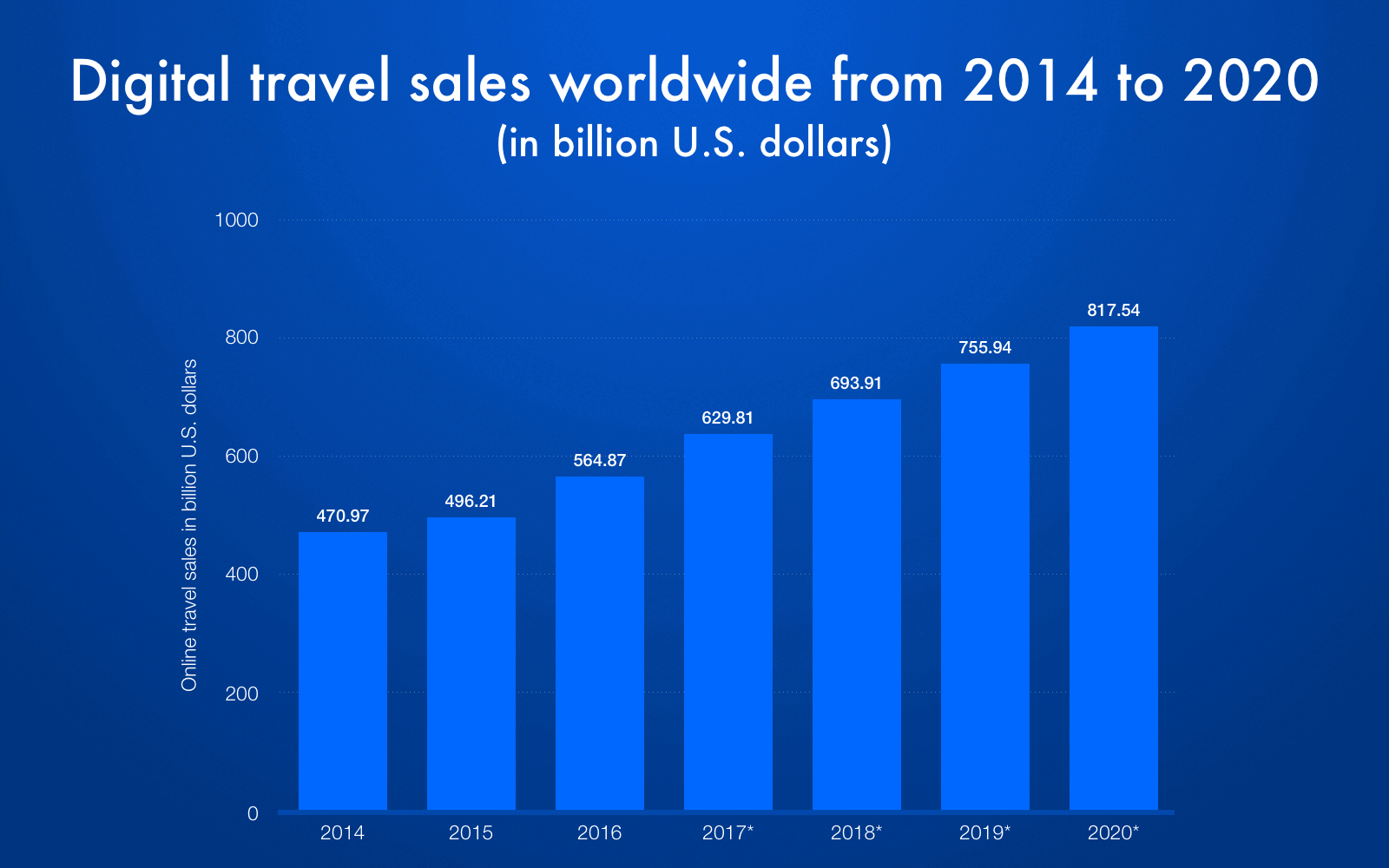
If we throw in some other numbers then we will find out that in the U.S. alone 88% of the population has shown trust in online hotel booking apps. The trend is very much similar if we take other countries into focus. Worldwide online travel sales were 564.87 billion U.S. dollars in 2016 and it has grown at an exponential rate to reach the mark of 755.94 billion U.S. dollars last year. In terms of market volume for online hotel bookings, the number is expected to cross $174 million in 2022.
Hotel reservation is indeed the primary focus of a hotel booking app but if you are looking to capture the market then other options like booking a taxi, flight, cruise, or package holidays prove to be of great significance. Not becoming stagnant and exploring other segments will lure in more and more customers for your app. The stats mentioned in the image suggests that the travel booking industry is growing at a booming rate and it is a great time to create a hotel booking app.
Business Models involved in Hotel Booking Mobile App
There are three types of business models that we normally associate with a hotel booking app. So, without any further ado let us dive straight into those model types.
Merchant Model
In this type of model, the app owners sign a contract with the hotel to own a certain number of hotel rooms on a discounted rate as they are getting a hold of the rooms on a wholesale basis. In the next step, these rooms are offered to the app users with an average margin of 10-40%. Prices of rooms and hotels may vary depending upon various factors, one of them being travel demands.
Expedia is the prime example of this type of business model, managing 17% of the digital travel business across 200 countries worldwide. However, implementing a merchant model will require a huge sum of money and Expedia has just that in the form of their huge capital gain.
Advertising Model
The advertising model provides you with the option of creating money through your hotel booking app. App owners generate capital by redirecting their users onto the hotel websites. Among all the business models that we are going to discuss, this model type is the least profitable but its plus point is less risk and investment involvement. Tripadvisor is the prime example of an app working on an advertising model as it earns most of its capital through cost-per-click charges.
Aggregator Model
The most popular form of hotel booking app and there is a strong reason behind it. Hotel booking apps working on this model tends to be in connection with a variety of online booking services. What it does is that whenever a user starts scrolling through a hotel booking app to look for a comfortable place to stay, he is provided with a large list of hotels having flexible price ranges. Once the user has found the hotel option of liking, he is redirected straight to that specific hotel website. Hotel Book and Booking.com come to mind when we think of aggregator model-based apps.
Dedicated Model
This type of model is the preferable option of widely popular hotel chains such as Marriott, Grand Hyatt, Hilton which have apps built in their names to merge all of their brands and resort brands. However, having a personal app for your hotels and chains proves to be a great idea only if your app popular enough. These apps are not created only by keeping the booking purpose in mind but by also taking other factors into consideration like special requests of users during their stay like the order of extra pillows, ironing board, a food item, or any other stuff of prime importance.
Popular Hotel Booking Mobile Apps & Services
Priceline

Expedia

TripAdvisor

Booking.com
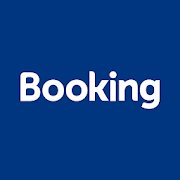
Kayak
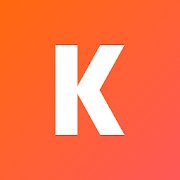
Multiple Listing Service (MLS) For Hotel Booking & Reservation
A multiple listing service is a central database or software that helps a hotel booking service gain more users by allowing the individual booking agents or hotels to share the available information regarding rooms or hotel listings in their area. A combined database of all such hotel listings is known as a multiple listing service database. This allows the customers to view more options of hotel booking filtered on the basis of city, state, zip code, and county.

Property Management System (PMS) For Hotel Booking
A property management system (PMS) is a specific hotel management web application that the hotel owners and front desk employees use to run their business efficiently. This software or application allows them to keep track and manage room booking availability, reservations, managing housekeeping, making adjustments to existing room reservations, etc. Another advantage of having a PMS for hotel booking app is that helps the management to keep a keen eye on key performance metrics like room occupancy rate (OR), average length of stay (ALOS), revenue per available room (RevPAR), depreciation, amortization, total Revenue, and total bookings.
Booking Engine for Hotel Booking Service
In layman terms, a hotel booking engine is a software application on hotel websites, mobile apps, and social media pages which makes it possible to capture and process direct online reservations and inquiries. A booking engine works in conjunction with the hotel property management system. Most hotels rely on travel agents and travel websites for listing their rooms. However, on each booking, the hotel has to pay a commission to the listing portal. The booking engine allows you to bypass that way and provides the user to book rooms through the official website, mobile app, and even the Facebook page.
The customer doesn’t have to website or app to book a room as the booking engine takes the information of the user to your website and makes the reservation. This reservation information is also shared with your PMS as the booking engine gets synchronized with it. This whole method makes the process of booking rooms very easy and hassle-free for tourists. As now customers can book rooms through different channels such as social media, app, and website. So, a booking engine or hotel reservation system helps you increase conversion, collect useful data, and provide an excellent experience to guests.
Features To be Included in a Hotel Reservation App
 Features are the blueprint on which a hotel booking app operates. So, having all the necessary ones while building a hotel booking app is paramount.
Features are the blueprint on which a hotel booking app operates. So, having all the necessary ones while building a hotel booking app is paramount.
1. Search Parameters
When the user starts looking for accommodation, the app will turn his focus onto a particular amount of parameters which includes City or place he is visiting, Dates of checking in and checking out, other members along with him, if he is carrying a pet and lastly, the number of rooms he will be requiring to stay in.
2. Booking and Cancellation
As soon as the user has decided upon the choice of the hotel he will stay in, he is directed to a safe and secure payment gateway like Debit/Credit Card, Braintree, Stripe. Most of the hotel booking services provide a complete refund to their users within the first 24 hours in case they had to cancel their booking. This feature of cancellation is of great benefit for the users but on the other end of the spectrum, it causes a lot of complications for the hotel owners as most of the cancellations are done just a day or two before the date of arrival of users.
3. A Complete View of the Accommodation
Providing a view of the accommodation from all angles can help you create a great rapport with the users as this is what they are looking for. The app should be looking to provide an overview, room status, gallery, maps, social media buttons, pool view, suggestions, and some other views.
4. Customer Account
User information which includes wish-list, booking history, currency, and preferred language is stored in the customer account. Users receive discounts and personalized offers depending upon the data owners collected from their profile.
5. Hotel Account
Necessary information associated with hotels in the form of prices offers related to information, discounts, best deals, available rooms is all made available through the Hotel account.
6. Payment Channels
After the users have decided upon the accommodation that suits them the best, they will be asked to do the in-app payments through a wide range of options in the form of Debit & Credit cards, Stripe, PayPal, Braintree.
Smart Features Associated with Hotel Booking App
Apart from the basic features mentioned above, if you add on some smart features then they will act as a catalyst in making your reach the desired audience. So, let us have a look at some of these smart features.
1. Estimated Cost Forecast
Costs of flights and hotels go up and down constantly which makes it hard for the users to calculate the final cost of their travel. Freeing the users from this problem by providing the data from the records will take your app a long way. An algorithm is built within the app which provides the users with seasonal trends, offers, and discounts that assist the user in booking reasonable flights and hotel rooms.
2. Recommendation Engine
Taking previous searches of the user into consideration, the app showers various recommendations like TripAdvisor offers, Booking.com offers on the users. With time more and more data gets collected which assists the algorithm in producing colossal results.
3. On the Go Travel guide
Travel assistants in the form of chatbots, Messanger, WeChat, Google Assistant provide all-time customer experience to the users. All the queries of the users are sorted by the users.
4. Virtual Tour
Users can get a feel of the hotel by going through the photographs, videos and can also enjoy the virtual tour with the help of 360 photos. Different sections of the hotel are covered through this feature.
5. Currency and Language Converter
As a part of a personalized strategy, the app should be able to adjust currency and language depending upon the customer location.
6. Analytics Dashboard
Admin has the access to enhance his decision-making by going through the hotel dashboard, customer dashboard, and flight dashboard. Bookings can be offered at a lower price when the frequency of bookings is low in a particular season.
7. CRM Integration
Integration CRM into your system will prove to be a masterstroke as making a customer feel at home is the prime objective of any hospitality service and CRM Integration will help you achieve just that.
8. Push Notifications
Any new feature that gets added to the app, information regarding the latest discounts and offers is provided to the customers through push notifications.
9. Marketing Tools
Marketing tools play a key role in attracting the audience you are looking to win over. In a nutshell, marketing tools involve Chatbots, Email marketing, paid social media marketing, and some other mediums.
Additional Features in a Hotel Booking App
If you are planning to create a hotel booking app that will always stay ahead of the competition then you should consider adding the following features to your hotel booking app.
1. Taxi Booking
When third-party integration comes into the picture in the form of Ola, Uber, and other similar, it becomes quite easy for the users to book a travel medium for them.
2. Places to explore
With the use of geolocation tracking features, users can look out for places to explore such as tourist spots, movie theatres, malls, and restaurants.
3. Hotel Comparison
As the app includes a long list of hotels, users can have a look at all the available options and then decide upon which hotel falls in the price and comfort range.
4. Restaurant Booking
Via third-party integration, users also have the option of booking a table in advance at their desired restaurant.
5. Trip Organizer
The app that you are creating should not only focus on booking hotels, it should also help out its users in planning the whole trip by providing a trip organizer.
Benefits that Hotel Booking App Brings Along
Hotel Booking app provides numerous benefits to all the parties concerned with it.
For Customer
Benefits for the customer include Convenience, security, reliability, value for money, discounts, efficiency.
For Hotel
These apps play a key role in attracting direct bookings as you can create sales at a pretty high rate. Direct reach out, Brand promise, customer loyalty, user-data, automation comes under benefits provided to the hotel through these apps.
For Travel Agent
Through this section, you can provide a major boost to your business as the app allows you to explore some new markets, user engagement, user data, and brand recognition.
For App Business Owner
App business owners tend to seek huge benefits in the form of user variety, user engagement, variety of revenue streams such as subscriptions, ads, commissions, fees, etc.
Third-Party App Integrations
Different type of app integrations increases the dimensions in which a hotel booking app operates and thereby increases the overall sales of the app.
Navigation
Google and Apple apps are included in the apps so that users don’t have to face any kind of difficulty in finding locations while they are having fun on their trip.
Taxi booking app
This feature allows the users to book taxis and cabs from within the app.
City Guide
This feature ensures that the users are having a proper look around the city without any hiccups.
Payment API
This feature allows users to perform safe and secure payments in whichever mode they prefer. Debit card, credit card, UPI, Braintree, PayPal, Stripe all are available in the app.
Also Read: How to develop E-Wallet Mobile App
Aggregator API
This type of API is provided to provide much-needed assistance to users.
Reviews API
This type of API proves beneficial when some new users looking to use the app wants to have surety about the background of the app by reading out reviews and ratings of previous users who have made use of the app.
Safe App Code
Every app needs to have this Algorithm code encryption along with API encryption and the source code needs to be scanned consistently.
Technology Stack Required to Develop a Hotel Booking App

- To look after data in real-time: Kafka software
- For storage purpose and caching with CDNs: Amazon S3
- For Desktop-based UI: Chromium Embedded Framework (CEF)
- For Primary Platform Structure: Google Cloud Platforms or Dataproc
- HTTP and Proxy Server: Nginx
- Payments: PayPal, Braintree, Stripe, eWallets
- SMS, Phone Verification, Voice: Twilio, Nexmo
- Push Notifications: Twilio, Push.io
- Stuff related to emails: Mandrill
- Real-time Analytics: BigData, Cisco, IBM, Apache Flink, Spark, Hadoop
- Maps: Google maps API
- Nearby destinations: Google places API
- Aggregator APIs: ZUMATA Hotel Booking API and Expedia Affiliate Network API
- Cloud Environment: AWS
- Streaming Media System: Nimble Streamer, Wowza Streaming Engine, Helix Universal Server
How Much it Will Cost to Build a Hotel Booking Mobile App
The total cost that goes into developing an app like a Hotel Booking Mobile App for IOS and Android depends upon various factors like its size and overall complexity. Apart from that, the location of the mobile app developers and total hours consumed in creating the app also plays a key part in rounding off the total capital that needs to be invested in the app. We have accumulated the charges asked by the developers of different across the globe.
- US-based developers: $100-$250 for an hour
- Eastern Europe based developers: $80-$180 for an hour
- India based developers: $25-$50 for an hour
A full feature loaded Hotel Booking App developed for a single platform will cost you in the range of $25000-$35000 and if you this app to be compatible with over one platform then you will have invest even more.
Conclusion
The Hotel Booking app business is evolving with each passing day, hence you need to be on top of your game to stay ahead of the competition. You need to constantly have a look at all new apps that are coming to the market and new exciting features they are bringing to the table. Inspirations for can be drawn from these newbies to make our app even more interesting.

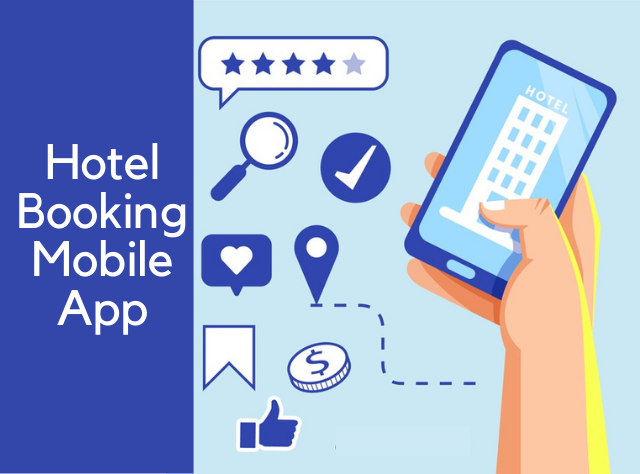



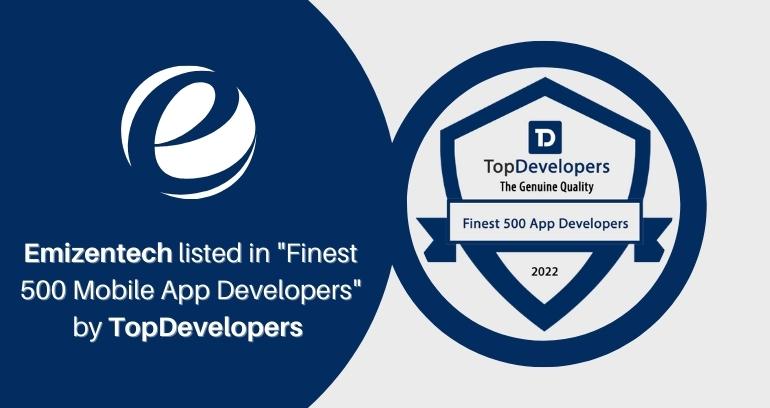

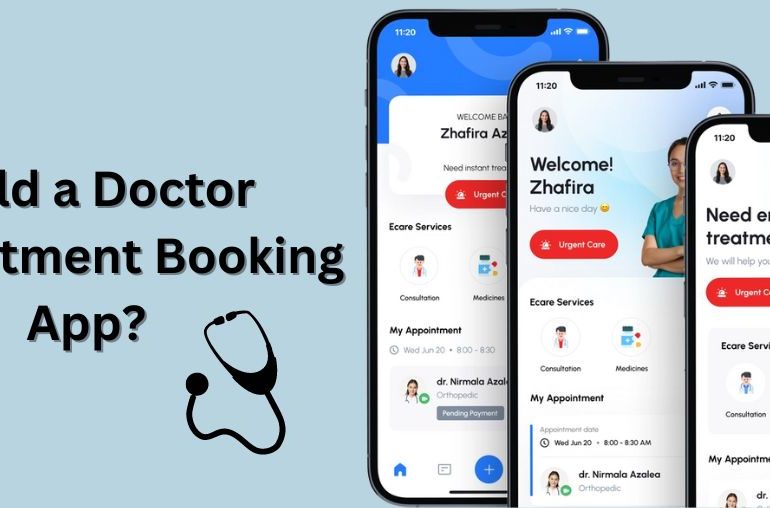
 USA
USA UK
UK Singapore
Singapore